
Dutch artist Joost Klein faced disqualification from the Eurovision Song Contest following an alleged backstage incident, resulting in his removal from the competition. The disqualification came after a female member of the production crew lodged a complaint of intimidation with Swedish police.
In response, Eurovision organizers deemed it inappropriate for Klein to continue in the contest while legal proceedings unfolded. Despite objections from Dutch broadcaster Avrtotros, Klein’s exclusion was upheld, prompting disappointment and shock from his supporters.
Klein, a favorite contender with his song “Europapa,” dedicated to his late father, had harbored aspirations of gracing the Eurovision stage since his youth. However, news of his suspension emerged abruptly during preparations for the grand final, casting a shadow over the event.
The European Broadcasting Union (EBU) reiterated a zero-tolerance stance on inappropriate behavior, leading to Klein’s removal from the competition. Reports suggest the incident involved a member of the production team, with organizers clarifying it did not involve other contestants.
Speculation arose regarding tensions between Klein and Israel’s entrant, Eden Golan, amid heightened sensitivities surrounding the Israel-Gaza conflict. However, organizers dismissed these claims, emphasizing a commitment to safety and unity among participants.
As a result of Klein’s disqualification, Saturday’s grand final proceeded with 25 acts instead of the planned 26, with no replacement feasible at such short notice. The unexpected turn of events underscored the unpredictable nature of the renowned music competition.
Joost Klein’s disqualification from the Eurovision Song Contest sent shockwaves through the music world, leaving fans and industry insiders reeling from the unexpected turn of events. Klein, whose pro-Europe techno anthem had captured hearts and imaginations, now found himself at the center of controversy, his Eurovision dreams dashed by allegations of misconduct.
As international media gathered outside Klein’s hotel in Malmo, Sweden, speculation ran rife about the nature of the incident and its implications for the competition. While initial reports hinted at tensions between Klein and Israel’s contestant, Eden Golan, organizers swiftly clarified that the altercation involved a member of the production team, distancing the incident from any inter-contestant conflicts.
The sudden departure of Klein not only altered the dynamics of the grand final but also raised questions about the integrity and safety protocols of the Eurovision event. With the European Broadcasting Union (EBU) emphasizing a zero-tolerance policy towards inappropriate behavior, the incident underscored the challenges of maintaining a secure environment amidst the high stakes and intense emotions of the competition.
For Klein, whose journey to the Eurovision stage was a deeply personal one, the disqualification marked a heartbreaking end to a lifelong ambition. Yet, amidst the disappointment and controversy, the show went on, albeit with a palpable sense of unease and uncertainty hanging over the proceedings.
As Saturday’s grand final unfolded with one less contestant, the absence of Joost Klein served as a poignant reminder of the fragility of dreams and the complexities of human interaction, casting a shadow over what was meant to be a celebration of music and unity.
MOST KEY POINTS :-

- Disqualification Drama: Dutch Eurovision contestant Joost Klein disqualified after backstage incident involving alleged intimidation, leading to his removal from the competition.
- Allegations and Response: A female production crew member reported an incident to Swedish police, prompting Eurovision organizers to send Klein home pending legal proceedings.
- Organizational Stand: Eurovision organizers maintain a zero-tolerance policy for inappropriate behavior, emphasizing a commitment to a safe and secure environment for all participants.
- Favorite’s Fall: Klein, a top contender with his song “Europapa,” dedicated to his late father, faced disappointment as his Eurovision journey abruptly ended.
- Speculation and Clarification: Initial reports hinted at tensions between Klein and Israel’s contestant, but organizers clarified that the incident involved a member of the production team, not other contestants.
- Contest Impact: Klein’s disqualification altered the dynamics of the grand final, raising questions about the integrity and safety protocols of the Eurovision event.
- Emotional Fallout: The incident left fans and industry insiders reeling, highlighting the fragility of dreams and the complexities of human interaction amidst the high-stakes competition.
- Continued Competition: Despite the setback, Eurovision proceeded with the grand final, albeit with one less contestant, casting a shadow over what was meant to be a celebration of music and unity.
